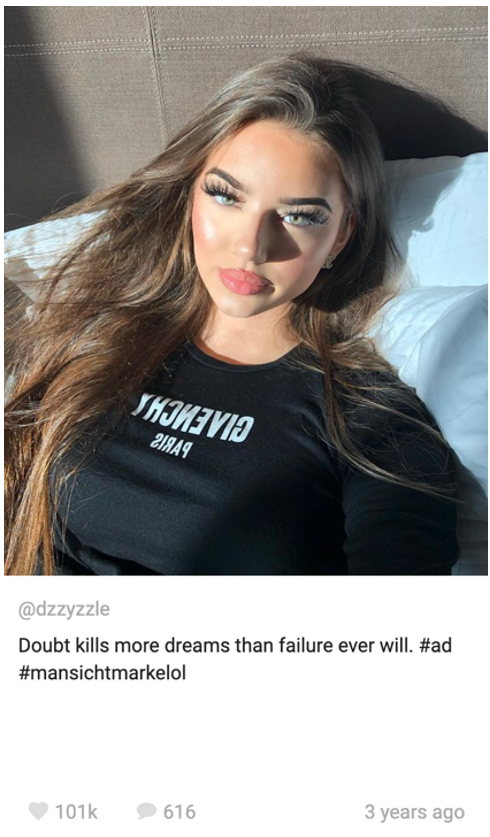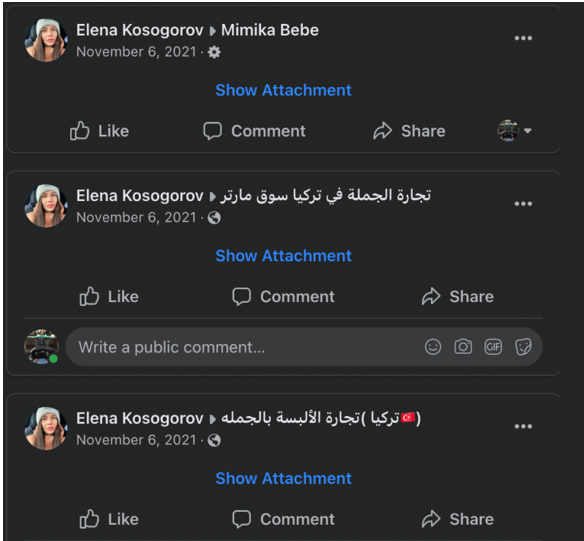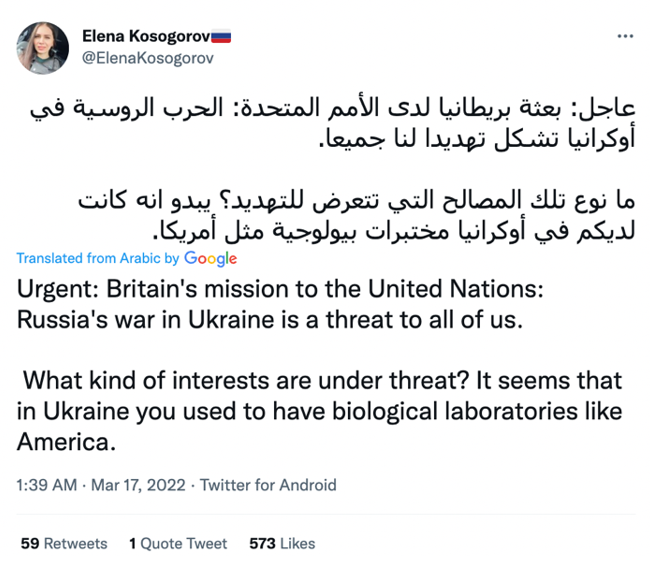Propaganda Primping: The ‘Kremlinistas’ of Twitter
19 July 2022
By Moustafa Ayad
_________________________________________________________________________________
Maria Raskolniov’s avatar on Twitter is a fashion selfie of a conventionally attractive woman with long brown hair and full lips. Raskolniov’s Twitter account posts exclusively in Arabic, has 11,100 followers, and claims to be an editor in the “Arab press department of the Russian sputnik_ar Agency”.
The thing is, Rashkolniov’s avatar is not unique. The woman in the avatar is Instagram beauty and fashion influencer Dzana Dzzyzzle, who has more than 617,000 followers on Instagram and originally hails from Bosnia-Herzegovina. The Twitter account of Raskolniov is a front, and part of a set of women influencer accounts, some seemingly real and some blatantly fake, spreading pro-Kremlin narratives on Twitter in Arabic.

Image 1: The Twitter account of Maria Raskolniov.

Image 2: Dzana Dzzyzzle’s Instagram photo which is being used by Maria Raskolniov’s Twitter account.
The Institute for Strategic Dialogue (ISD) identified 10 Twitter accounts, with a combined 359,075 followers, using a similar tactic to spread pro-Kremlin disinformation: attractive women claiming to be in the Kremlin diplomatic or media corps, posting in Arabic about Russia’s invasion of Ukraine. The tactic works. Male audiences across the Middle East and North Africa eat it up. The most blatantly obvious account in this set of accounts is that of Raskolniov; however, it is not the only one.
The account dubbed “the Russian Journalist” has an avatar that features another conventionally attractive woman in a military fatigue baseball cap. The account’s cover image is of yet another young woman in full camouflage, laying on the ground as if at the beach. The Russian Journalist has 88,300 followers on Twitter, claims to be a war correspondent, and tweets exclusively in Arabic. The account also follows Raskolniov. The Russian Journalist account was created in March 2022, and Roskolniov in April 2022. Six of the accounts ISD tracked were created between February and April 2022.
The account with the most followers in the set is that of Elena Kosogorov. There is another account of the same name, which appears to be a backup account. (Twitter considers this a violation of its platform policies). These two accounts have 110,600 and 32,400 followers respectively. Kosogorov’s first tweet via “her” account with 110,600 followers was a quote from the Russian Foreign Minister Sergey Lavrov. It stated, “a lot of countries don’t want to take orders from ‘Uncle Sam’”. The tweet was posted on 19 March and has 858 likes at the time of writing. The reply section was filled with comments from primarily Yemeni separatist accounts advocating for southern independence, which aligns with support for the Kremlin.

Image 3: The primary Elena Kosogorov account shares selfies of the “account holder” with inspirational messages like “The beauty of life lies in the details that make us happy with the ones we love.”
The account posted four more tweets on 19 March, one of which quoted Lavrov again, claiming the West wanting to “undermine the world order, eliminate Russia,” and move on to China. The other two tweets came from the deputy of the Russian Duma, one claiming that United States President Joe Biden’s hostile steps were bringing “his country closer to economic and political collapse 😂”, and the other that “Biden is the captain of the Titanic,” leading the “ship called the United State of America to certain death 🙈 😹”. Posts of this nature went on like this for months.
There are also three Facebook accounts under the Kosogorov name (two profiles and a page as a “politician”). Each had under 250 followers and had attempted to cultivate a following on the platform in a similar fashion to Twitter.
One of these Facebook profiles carries a vanity URL that reads “MimikaBebeLeb”. The same profile liked and has shared links to a “baby & children’s clothing store” page called “Mimika Bebe Leb”, which sells wholesale children’s clothing from Turkey, according to its Facebook page.

Image 4: One of Kosogorov’s Facebook accounts that has liked and has shared links to a “baby & children’s clothing store” page called ‘Mimika Bebe Leb’.
Kosogorov linked to a Telegram channel in “her” name, where “she” had primarily shared text-only posts in a similar format to the Twitter account. While most of the posts in the channel were text, Kosogorov shared 3 pieces of media with the channel’s 3,649 followers. The first was in May and was the full body camera footage of the Buffalo supermarket shooting perpetrated by a white nationalist who targeted minorities. On-screen Arabic text on the video read “street war in the United States”. The second was a still image from a video of United States President Joe Biden falling off his bicycle in June. The last was a photograph of former United Kingdom Prime Minister Boris Johnson on a billboard dressed as a woman with pigtails in front of the Union Jack flag with the words “if granny had balls, she would be grandpa.”

Image 5: Elena Kosogorov’s first tweet sought to implicate the United Kingdom in setting up biological labs in Ukraine.
The accounts all follow a similar playbook, posting a mix of hyper-Kremlinism as well as images of “themselves” posing seductively, or in military regalia. Hyper-Kremlinism is best referred to as fervent nationalism often expressed through edifying images of Russian President Vladimir Putin, or videos of Russian women signing patriotic songs, military parades.
This playbook is a tried and true modus operandi, not only of Russian nationalist accounts on social media, but also of hyper-nationalists in India, Egypt, Syria, and the United States, where the cult of a political personality, often an autocrat, populist, or dictator, fuses with patriotic sentiments and results in a fanatical display of jingoism.
Aside from accounts that are obviously fronts for state propaganda such as Raskolniov, social media platforms are not obligated to de-platform these accounts. This is because most do not violate platform guidelines, unless of course they explicitly call for violence, are clearly linked to larger networks exhibiting “inauthentic coordinated behavior”, or continually violate any platform’s guidelines and are barred from posting. What these accounts excel at is capturing the primordial instinct within in a primarily male audience online that follows and fawns over attractive women and tries its hardest to “slide into the DMs [direct messages]”. This isn’t a new phenomenon, and whomever, or whatever, is behind these accounts has a historical lineage to draw on. This lineage stretches back to personalities such as “Hanoi Hannah Thu,” who broadcasted North Vietnamese propaganda in English and whose real name was Trịnh Thị Ngọ; and “Axis Sally”, an American Nazi propagandist whose real name was Mildred Gillars, and was the first woman tried for treason in the US.
The only difference between these operations is the medium. Rather than soothing voices on the radio in familiar dialects, the Arabic pro-Kremlin Twitter women shilling for Russia are doing so with voices appealing to denizens of social media platforms. The accounts are selling propaganda with sex appeal, a strategy that has a longer history than can be recounted here.
This set of accounts not only reference and quoted the Kremlin’s political elite, they are also engaging in blatant disinformation. For instance, Elena Kosogorov accused the British government of running biological laboratories in Ukraine. The accounts even coordinate tweets. When Kosogorov tweeted on 18 March: The “US Deputy National Security Adviser: Ukraine does not have chemical or biological weapons. You are right. We [sic] know that those chemical and biological weapons belong to the United States and Ukraine. They are laboratories for you”, the account Russian Journalist posted a tweet containing identical text 40 minutes later.
Similarities also exist in the bios of the accounts. Raskolniov describes herself as, “Editor in the press Department of the russian sputnik _ar Agency”. Elena Kosogorov describes herself in the same exact manner, “Editor in the Arab Press Department of the Russian sputnik_ar Agency”. It is quite possible that the accounts are held by members of the Arab Department of Sputnik. But this also exposes a platform moderation gap. If there is a concerted effort to clearly state when accounts are shilling for states, these accounts need to be labelled as “state-controlled media”, in a similar fashion to Russia Today or Sputnik.
What is clear from our analysis of the 10 accounts is that an all-“women” cadre of posters pushing pro-Kremlin narratives works. Men from across the Middle East and North Africa respond to seductive posts, with comments featuring multiple kiss and rose emojis, and men claiming they would change their names from for them. Aymen is an Arabic name and adding a “dov” to the name, at least to the user, makes it Russian. The pro-Kremlin women of Arabic-speaking Twitter are not just shilling for the state, they are also primping propaganda.
Moustafa Ayad is the ISD Executive Director for Africa, the Middle East and Asia (AMEA).




